Tom Kepler's Blog, page 8
May 25, 2019
The Spenser Detective Novels: How Ace Atkins Channels Robert B. Parker
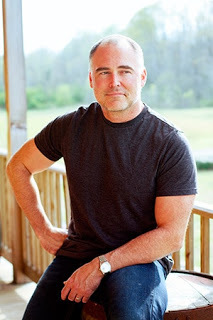 Photo by Joe WorthemRobert B. Parker's last Spenser novel to be published was Sixkill, which introduces Native American Zebulon Sixkill, who becomes Spenser's protege in the fine arts of sleuthing. Since Parker's Sixkill, author Ace Atkins has written seven Spenser novels, the last I've read being
Old Black Magic
. I was curious about how Atkins would handle the Spenser novels. Could he write with the same rhythms and little stylistic beats that Parker employed? Could he characterize Parker's cast so that continuity of character was maintained and believable? Could the Spenser novels continue to evolve and not become petrified, Atkins slavishly mimicking Parker's art and craft?
Photo by Joe WorthemRobert B. Parker's last Spenser novel to be published was Sixkill, which introduces Native American Zebulon Sixkill, who becomes Spenser's protege in the fine arts of sleuthing. Since Parker's Sixkill, author Ace Atkins has written seven Spenser novels, the last I've read being
Old Black Magic
. I was curious about how Atkins would handle the Spenser novels. Could he write with the same rhythms and little stylistic beats that Parker employed? Could he characterize Parker's cast so that continuity of character was maintained and believable? Could the Spenser novels continue to evolve and not become petrified, Atkins slavishly mimicking Parker's art and craft?Simply stated: would Atkins' novels of the Spenser saga possess a body but lack a soul?
I read Atkins' first Spenser novels, Lullaby and Wonderland, with some misgivings. I was not displeased but was overall uninspired to read more. There were moments where the novels flowed well--and they weren't disagreeable--but there was a certain heavy-handedness and woodenness to the action and dialogue. Parker's use of short chapters that always ended with that clever little drum roll of action and dialogue too often seemed obvious or contrived. Atkins was competent, consistent, and respectful with his material--and just too competent, consistent, and respectful with the Spenser oeuvre. I was pleased to read more about Spenser and company, but I was not inspired to read more. At least not fully inspired. There were, however, moments when Boston was Parker's Boston and Spenser was Parker's Spenser.
And so I tried more of Atkins' Spenser novels, discovering something deeply satisfying and revelatory. The new Spenser novels transformed from clever, masterful Parker forgeries to creative, innovative detective novels in their own and Adkins' right. In Adkins' Spenser novel Old Black Magic, Spenser has a conversation with a competitive sleuth about how the Brit is wearing a Red Sox baseball hat. "'You should try and curl the bill of the hat,' I said. 'You look ridiculous.'" A few lines later, Spenser observes, "Marston smiled up at me, looking very silly in the Sox cap. He wore it far back on his head like a child, with his hair loose over his forehead." It took Atkins a time, but he has fully learned how to "curl the bill of the hat" and wear it properly. Most importantly, though, Atkins is no longer wearing Parker's writing hat. He's got his own Sox cap now, all broken in, and it fits him perfectly.
Can Atkins write with the same rhythms and little stylistic beats that Parker employed?
Atkins is obviously an attentive reader because he is able to use those signature stylistic patterns and mannerisms that made Parker's development of the Spenser novels so readable and identifiable. Some of Parker's "Spenser style" included short chapters, ending each chapter with some clever beat so that each chapter was a self-contained vignette, attention to clothes and cooking, and "readiness is all," that powerful force of protocols infused with personal integrity.
As Atkins has written the novels, the good event is that the inclusion of the elements mentioned above (and more, of course) have become smoother. There is the sense that Atkins began with a list of stylistic elements that he felt must be included in the novels to create a familiar environment for the reader, yet over time those elements became more natural and less contrived. The most obvious example of this "feeling comfortable in the other guy's coat" is that as Atkins' writing has continued through the Spenser novels, the chapters have gotten longer and the end-of-chapter bada-bings have become more subtle. Atkins still pays homage to the master, yet he has discovered his own affinity toward those elements.
Can Atkins characterize Parker's cast so that continuity of character is maintained and believable?
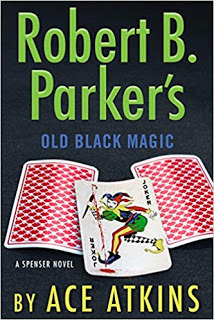 The short answer to this is "yes." I think Atkins' ability to work with Parker's characters will also improve with time. I believe this because Atkins' utilization of the Spenser cast has improved throughout the novels he has written. There are occasional missteps, such as in Old Black Magic (which I thought well-written), there are some points where I think the character of Vinnie is too glib in his dialogue. However, these smaller moments are minor compared to how believable and true the Vinnie Morris character reads as compared to Parker's characterization.
The short answer to this is "yes." I think Atkins' ability to work with Parker's characters will also improve with time. I believe this because Atkins' utilization of the Spenser cast has improved throughout the novels he has written. There are occasional missteps, such as in Old Black Magic (which I thought well-written), there are some points where I think the character of Vinnie is too glib in his dialogue. However, these smaller moments are minor compared to how believable and true the Vinnie Morris character reads as compared to Parker's characterization.I think Atkins has chosen a very clever and effective course of action regarding Parker's characters. What Atkins has done is to take Parker's minor characters, choose those he has an affinity with, and then to develop them in his novels, to expand the characters, to essentially make them his own. He has done this effectively with Vinnie Morris and also with Henry Cimoli and the Harbor Health Club.
Atkins has also deftly managed the adoption of Parker's cast by not saturating his novels environments with the old gang--not all at once. Hawk is off working in South America; Z is setting up business on the West Coast. Quirk has been promoted and there is a new precinct captain. Atkins then can interact with Parker's characters, but not all at once. There can be Susan and Pearl. There can be a segment with Quirk, a bit of Belson, some moments with Rita Fiore, but not a sink-or-swim environment like Parker's novel Potshot, which even Parker struggled to manage.
Atkins introduces new characters like Large Marj Phillips in Old Black Magic, art museum manager and hardass, a character totally natural to Spenser's universe. Times have changed, too. Characters have aged. This is to Atkins' advantage because we see thug Jackie DeMarco not as Parker described him but as Atkins must newly envision him with the passing of years. All these realities of a long series of novels about a single character have led to Atkins successfully maintaining the believability of the Spenser characters.
Can the Spenser novels continue to evolve and not become petrified, Atkins slavishly mimicking Parker's art and craft?
The best choice Atkins has made--and that the publishers and editors have allowed him--is that he has chosen to write his own Spenser novels. Atkins is a novelist in his own right. His website says the following: "New York Times Bestselling author Ace Atkins has been nominated for every major award in crime fiction, including the Edgar three times, twice for novels about former U.S. Army Ranger Quinn Colson. He has written eight books in the Colson series and continued Robert B. Parker’s iconic Spenser character after Parker’s death in 2010, adding seven best-selling novels in that series." Reading Crossroad Blues, Atkins' first novel, is to see how Atkins has adapted his skills and styles to the Spenser saga; his has not excised them. Robert B. Parker has praise for the novel: "Crossroad Blues sings. It proves that big guys can write, and that Ace Atkins can write better than most." No, Atkins does not slavishly mimic Parker's Spenser novels. He has found his own voice, and he sings his own interpretation.
In the end, the only way the Spenser tome can continue is if the saga, the characters, and the soul of the novels continue to evolve. Atkins and the Spenser publishers are on the right path. Let me just come out and say it--I enjoyed Old Black Magic more than some of the Spenser novels Parker wrote. It reminds me of some of the earlier Spenser novels, where Parker's style was still more fluid, where his chapters were longer, and where the strict attention to detail and action superseded character. "Just the facts, ma'am." The universe of Spenser now lies in the hands of Ace Atkins. As the saying goes, you built the channel before it rains. Atkins was a skilled mystery novelist, praised by Robert B. Parker, before Atkins ever wrote a Spenser novel. The canal has been surveyed, the channel dug, now let the Spenser novels flow.

Published on May 25, 2019 03:33
April 5, 2019
Tri Odd: An Exploration of the Quirky, a Free Ebook
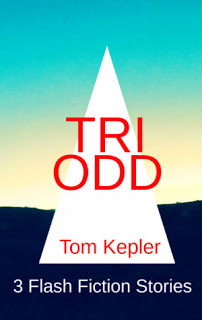 What do you do when you've finished your novel, published it, and are ready to embark on the next project? I decided to stretch my writing envelope, to try some characterizations, genres, and topics that I had not attempted before. One consequence of that experiment in writing is the free ebook Tri Odd, three flash fiction stories where I set some writing ground rules that were--for me, anyway--non-typical.
What do you do when you've finished your novel, published it, and are ready to embark on the next project? I decided to stretch my writing envelope, to try some characterizations, genres, and topics that I had not attempted before. One consequence of that experiment in writing is the free ebook Tri Odd, three flash fiction stories where I set some writing ground rules that were--for me, anyway--non-typical.I wanted to write about characters I didn't like or admire. I wanted to try writing something besides fantasy, to "cleanse my palate" after my hundred-thousand-word novel The Stone Dragon. I wasn't tired of fantasy; I just wanted to try something new. The end result was a science fiction story, a thriller/horror story, and a crime story. Macabre? Quirky? Maybe, but experiments under a thousand words. I wasn't ready to channel Stephen King for a couple hundred thousand words.
"Cull" is a story about a retired English teacher, a wiry, elderly woman who is very much in control . . . and as hard as nails. She loves rabbits, breeds them for show, and has organized her life just as she wants it to be. Then an interruption occurs and the story begins. "Cull" was originally published in Metazen, an online daily fiction site which is now defunct.
"In the Beginning" is a science fiction story that was fun to write. I enjoy reading science fiction but had not ever written in the genre. The story provides a science fictional perspective to the Biblical story Genesis and how humanity has always had this thing about following directions. It was published by the online flash fiction website 365tomorrows, on New Year's Day.
"Spider" is a thriller/horror story. I'm not sure it can be classified as "horror" because I don't wallow in the creep factor, but there is a slow and subtle sidling up to the macabre situation that arises when one fixates on spiders in the month of October. The story was originally published by the website Every Day Fiction, on Halloween Day.
One powerful characteristic of flash fiction is the power of inference. In one thousand words or fewer, the reader must be provided clues so that the ramifications of the storyline can be inferred. The words stop but the story continues in the imagination of the reader. I enjoyed using that writing technique in these stories, of providing a kicker. In a very real way, flash fiction is much like poetry in that every word is composed in a manner to provide a "more than usual meaning."
Tri Odd is available as an ebook for free at the following links. Feel free to read the stories, and hopefully you will be inspired to read more of my writing.
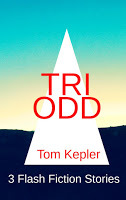 Tri Odd at AmazonTri Odd at Smashwords
Tri Odd at AmazonTri Odd at Smashwords
Published on April 05, 2019 14:08
February 28, 2019
Netflix Movie: The Hundred-Foot Journey
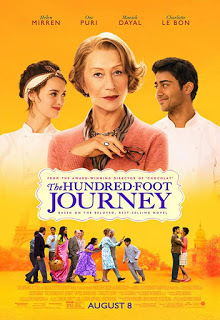 My wife and I are fans of Netflix's
Chef's Table
cooking series. It inspired us to watch the wonderful cooking movie
Chef
, starring Jon Favreau about a "taco truck" cook and his family, and now has inspired us to watch the movie The Hundred-Foot Journey, streaming now on Netflix. The movie provides a great evening's entertainment and is an inspiring and thoughtful production that includes a side order of romance.
My wife and I are fans of Netflix's
Chef's Table
cooking series. It inspired us to watch the wonderful cooking movie
Chef
, starring Jon Favreau about a "taco truck" cook and his family, and now has inspired us to watch the movie The Hundred-Foot Journey, streaming now on Netflix. The movie provides a great evening's entertainment and is an inspiring and thoughtful production that includes a side order of romance.The IMDB storyline of the movie, written by Kenneth Chisolm, follows:
The family of talented cook, Hassan Kadam, has a life filled with both culinary delights and profound loss. Drifting through Europe after fleeing political violence in India that killed the family restaurant business and their mother, the Kadams arrive in France. Once there, a chance auto accident and the kindness of a young woman, Marguerite, in the village of Saint-Antonin-Noble-Val inspires Papa Kadam to set up a Indian restaurant there. Unfortunately, this puts the Kadams in direct competition with the snobbish Madame Mallory's acclaimed haute cuisine establishment across the street where Marguerite also works as a sous-chef. The resulting rivalry eventually escalates in personal intensity until it goes too far. In response, there is a bridging of sides initiated by Hassan, Marguerite and Madame Mallory herself, both professional and personal, that encourages an understanding that will change both sides forever.The satisfying resolutions of the conflicts of the film are founded in the consciousness of the individual characters. The bigotry and violence that occur are ultimately resolved not by social awareness or education but by the personal insights and values of the individuals involved. Love, acceptance, integrity, and compassion are the pillars of this movie, yet those values are not over-played. The movie progresses with its dramatic and comedic elements, unreeling seamlessly the choices and actions of the characters. And most of this is centered in the beautiful French countryside.
The main romantic and dramatic pairings in the movie are Helen Mirren (Madam Mallory), restaurant owner, and Om Puri (Papa Kadam), family patriarch, the autumn-romance couple; and Manish Dayal (Hassan), chef extraordinaire, and Marguerite (Charlotte Le Bon), sous chef, the younger romantic interest. However, romance is not at center stage; it is a tension and an unspoken hope throughout most of the story, secondary to the ambitions and anguishes of the characters that weave the fabric of the story. The acting in the movie was a nice touch--masters of the craft in Mirren and Puri combining both drama and comedy in a believable mix, Dayal and Le Bon providing a refreshing reminder of the winsome power of discovered love. The directing consists of subtle beats and light touches; the costumes are believable, lovely, and at times outrageous.
I just have to come out and say that the manner in which the conflicts of the story are resolved is immensely satisfying. The action reveals that it is possible to see what needs to be done and then to make the correct decision. In this movie, the main characters search for meaning and fulfillment in their lives. They wrestle with their duties, ambitions, and sorrows, and that struggle is believable. They make their way through, though, and complete the journey to become individuals of balance and integration.
Nowadays, there is so much attention placed on the crudity and roughness of the world. This movie was a refreshing reminder that we define our world and that we need not be scarred by the vicissitudes and challenges we face. We can prevail. We can find beauty and love. We can make a positive impact. This movie certainly did that for me.

Published on February 28, 2019 04:09
January 27, 2019
Building a Free Ebook--Tri-Odd
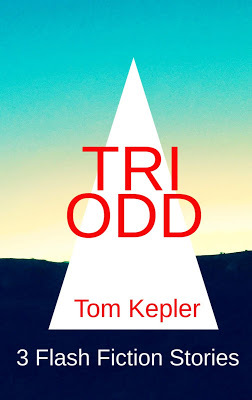
I haven't published anything for a while beyond my blog--and I'm interested in getting back into my independent publishing part of my writing. Therefore, I'm putting together a free ebook of three flash fictions stories that were published in three online magazines a little less than ten years ago.
"Cull," in Metazen, 2010 (magazine no longer active)"Spider," in Every Day Fiction, 2010"In the Beginning," 365 tomorrowsI mention these three and more in a blog post, "A Cat Has Nine Lives--How Many a Writer?" that summarizes my publishing over the last years. I've tried quite a few different genres and formats!
I am glad that in this small way I'm refreshing my publishing sites, reviewing the steps of publishing, and reviving my writing beyond blogging. I'm also enjoying reminding myself how to do some basic work with photos in order to create blog headers and book covers. All good--and useful--skills.
It's a cold, cold Iowa winter, my wife's gone on business, and I'm looking forward to exploring a new publishing venture. Without cost to me or my readers, no worries! I'll let you know when the ebook is available.

Published on January 27, 2019 04:50
January 20, 2019
The "Metacognitive" Blog Article
 For the author, writing when camping is a part of his glamping.I'm sure this has been done before--lots--but I don't know the name for the blogging technique where the blog writer/administrator writes an additional piece that utilizes content from earlier, similar posts. Metacognitive means "thinking about thinking," and I use the term for this post to describe a post that reflects on the content, themes, and ideas contained in a blog's prior articles. Since my most active blog at this time is my camping blog, Green Goddess Glamping, I will reference that blog for illustrative examples of "metacognitive blogging."
For the author, writing when camping is a part of his glamping.I'm sure this has been done before--lots--but I don't know the name for the blogging technique where the blog writer/administrator writes an additional piece that utilizes content from earlier, similar posts. Metacognitive means "thinking about thinking," and I use the term for this post to describe a post that reflects on the content, themes, and ideas contained in a blog's prior articles. Since my most active blog at this time is my camping blog, Green Goddess Glamping, I will reference that blog for illustrative examples of "metacognitive blogging."I created Green Goddess Glamping almost six months ago and have posted twenty-six articles as of now, mid January. Learning from my earlier blogs, I have limited my labels for posts to eight, hoping I never get over a dozen. Too many labels, I feel, become so cumbersome that the organizing device stops working. The labels I've created so far are the following: Camp Cooking, Camp Routines, Gearing Up, Glamping, Holiday Themes, The First Expeditions, Why a Tiny Trailer? and Tiny Trailer Owner Profiles.
As I'm writing this in January, camping season is on hiatus--either that or I camp in single digit to below-zero weather. Analyzing the articles I've written, I realize that some posts have similarities, and since my opportunities for camping travelogues are zeroed out right now, one writing opportunity for the GGG blog is to reflect and write retrospectives utilizing content from previous posts. One such recently published article, which analyzes the content of three earlier blog posts, is "Why Choose a Teardrop or Tiny Trailer?" These three original articles had some diversity, being labeled under the categories of Why a Tiny Trailer?, Glamping, and The First Expeditions. Although the original articles had diverse focus, each did include the theme of the rewards of minimalist trailer camping.
Developing "Why Choose a Teardrop or Tiny Trailer?" not only creates new content for the GGG camping (and also this) blog, I'm also directing readers back to earlier articles by providing links, thereby encouraging them to spend more time on my site. The camping article also utilizes keywords for search engines because the article focuses on a topic or current interest for my website's content: teardrop or tiny camping trailers; that focus is positive and not contrived because it is a relevant topic explored in a useful manner.
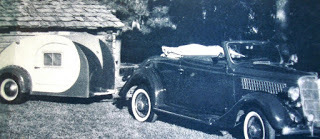 My parents' mode of travel on their honeymoon, 1946.The concept or "recycling" or reusing previous content is not new. I remember reading a while back about a freelance writer who traveled to a city and experiencing its charms--and then wrote three articles for various publications: one about the tourist sites, one about food, and a third about one of the city's historical sites. The author explained this as simply an efficient use of time. The same can be said for revisiting previously written blog posts. Some (and perhaps most) will contain facets that were in shadow during the first telling but which can be revealed to good effect with a shift of perspective a new article provides.
My parents' mode of travel on their honeymoon, 1946.The concept or "recycling" or reusing previous content is not new. I remember reading a while back about a freelance writer who traveled to a city and experiencing its charms--and then wrote three articles for various publications: one about the tourist sites, one about food, and a third about one of the city's historical sites. The author explained this as simply an efficient use of time. The same can be said for revisiting previously written blog posts. Some (and perhaps most) will contain facets that were in shadow during the first telling but which can be revealed to good effect with a shift of perspective a new article provides.All three camping articles I used for my new article dealt with concepts relating to having a fulfilling camping experience, an experience with "a balance of simplicity and comfort, ease and elegance." Each article illustrates a different facet of that positive, balanced camping experience. Each article provides examples of how camping in a tiny trailer provides a unique, satisfying camping experience.
"Why Such a Tiny Trailer? Teardrop Owners Speak Out": From the level of expertise of tiny trailer owners, this article provides a diversity of experience and opinion."How the Green Goddess Glamps": Exploring the concept of "glamorous camping," even minimalist trailer camping is shown to have a "cozy" glamour."It's Not Just How Many Miles or Places": This more personal piece explores the idea that perspective and attitude are more important than equipment and technology for a positive camping experience.My reflective, "metacognitive" overview of my camping experience as revealed in specific a blog post is first of all instructive to me, providing me with clues as to how I can personally increase the rewards of camping. It is instructive for me both in terms of personal pursuits and also as the owner of a tiny trailer. The focus of the article also increases its impact; by targeting a specific audience, the article differentiates itself from more general articles. If we write not only to teach but also to learn, then "metacognitive blogging" allows a writer to both reflect and publish, a win-win writing situation.

Published on January 20, 2019 03:08
January 6, 2019
Nine Years Since Publishing "Bare Ruined Choirs"
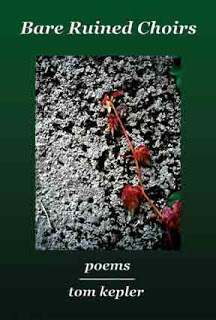 It's been nine years since I published my poetry book Bare Ruined Choirs, and I'm still proud of those poems.
It's been nine years since I published my poetry book Bare Ruined Choirs, and I'm still proud of those poems.Writing poetry is certainly different than prose--more than usual meaning and manner, to paraphrase the Romantics. Writing those poems took time, often years. I was in no hurry to "finish" a poem; the process of revising and refining itself was fulfilling. The poems in the book suggest the life cycle of a relationship, from first meeting to last good-bye.
Autobiographical? Of course . . . but not exactly. Beginning with personal experience or emotion, the process of refinement was a movement from personal and specific to universal. I think this is true of all art, discovering the ocean in a drop of water.
So in celebration of how those poems resonate with the universal ocean of life, of which my poems and I are but a drop, I post today these words and cover photo of my book.
Here is a link to two poems from the book, audio recordings by me of "Sleeping Magnolia" and "I Forgive Your Death."

Published on January 06, 2019 11:01
December 22, 2018
What Is the Purpose of My Life?
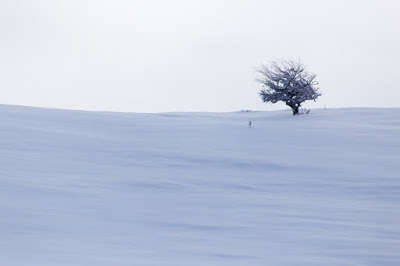 As I sit to write at early, early Friday morning on the winter solstice, a north wind blows outside and the sun has not yet risen. Sunrise is two hours away, and as I walked in the darkness this morning to the garage for a galvanized metal bucket so that I could empty the ashes from the woodstove, it was not excessively cold but rather just under freezing. Even the north wind with its bite was not ravenous.
As I sit to write at early, early Friday morning on the winter solstice, a north wind blows outside and the sun has not yet risen. Sunrise is two hours away, and as I walked in the darkness this morning to the garage for a galvanized metal bucket so that I could empty the ashes from the woodstove, it was not excessively cold but rather just under freezing. Even the north wind with its bite was not ravenous.The fire is busy now warming, my wife sits beside the stove drinking tea and enjoying the dancing light of the fire, and I type out words to explore: What Is the Purpose of My Life? I write these words without heaviness. This is no dark night of the soul. Purpose reminds me of Archibald MacLeish's poem "Ars Poetica," which ends with “A poem should not mean / But be.” The Poetry Foundation tells us that this poem is just one of a long series of poetic meditations on the art of poetry, and provides a number of references.
If art mirrors life, then it can be said that our lives are not meant to mean but be, that who we are is more important than what we do, that who we are is the foundation of what we do. Being precedes becoming. I think of my life: I am a man, a teacher, a husband, a father, a writer. "I am" is the foundation and the continuity. "Man, teacher, husband, father, writer"--the list could continue forever, for howsoever many words or concepts exist, and then simply flip the polarity and define oneself by what one is not: I am not a woman, a monk, a surgeon, a danseur, a diamond. That which remains steady is that continuity of consciousness, that "I am."
I remember--one of my earliest memories at four or five years of age--when my family lived "out in the sticks," as my father said, in Northern California, near the Feather River in the black oaks of the foothills of the Sierra Nevadas. I was out by myself, walking our long gravel-and-red-dirt driveway, and I stopped before a tangle of brush beside a gnarled digger pine tree. It was as if I were passing a neighbor and stopping for a hello. My awareness recognized another awareness, yet "my" and "other" are misleading words--more that I looked into a mirror and saw myself looking back: my eyes looking into my eyes looking into my eyes, an infinite loop of awareness. I said my greetings and moved on, but I have always had a special fondness for digger pines, a conifer with long, gray needles, the seeds from its large cones eaten by the Maidu Indians, who were the indigenous to that area.
When I grew up and moved away to college, there was a tree on the UC Davis campus that I would sit beneath and rest and read, a digger pine. Although I never hugged those trees, they connected me. I find my "retired" self now remembering that digger pine as it leaned toward the sun and so silent yet so alive, its roots reaching deep into the subsoil to find moisture; find myself remembering the rough bark of that pine on the college campus, my back pressing to its rough surface. It's as if my roots reach back through the years of experiences and memories to those early beginnings of an awareness of silence, a commonality of consciousness, as if those silent trees taught me how to dig deep into the soil of my being. Awareness curves back upon itself and perceives the continuity, sun warm upon a young face and woodstove warmth upon an elder. First we are; then we grow, expand, and take joy in our expansion. First the stillness, then the myriad bustle of the world.
I published in 2009 a book of poetry, Bare Ruined Choirs , and one of the poems in the book is "Winter Solstice," first published in 1993 in the Hiram Poetry Review. It's about reaching back, reaching deep, about our infinite depths and the roots of our lives.
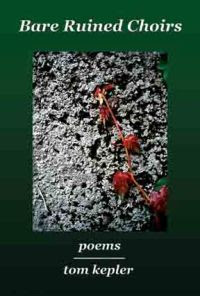 Winter Solstice
Winter SolsticeClouds like branches heavy with fruit
sag in the sky above the orchard,
raindrops leaning toward their long fall.
Day greys, moss blurs the being of stones,
horizons erode, ravines ruin the sky.
If I could gather enough silence,
I would root myself to this moment,
turn the inedible rind of the seasons
to rhymes ringed in the flesh,
to plum leaves drifting from the branch.
The worm breaches the red flesh of the plum;
leaves burst green from our scars.
The storm works in wet rhythms above me,
air fringed with beads, dark with cloud.
Rain drops from eaves, craters the stillness.
Beyond branches, tendrils of cloud
twine the seams of trellised sunlight,
break through this least of days.
Cloud, rain, this thicket of the sky.
Leaves burst green from our scars.

Published on December 22, 2018 04:36
December 16, 2018
Book Review: Wild--from Lost to Found on the Pacific Crest Trail
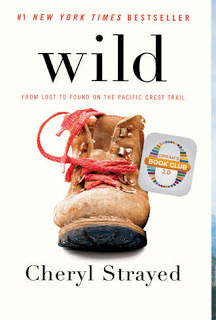 I came to this book via the back door, a little over fifteen years after
Wild--from Lost to Found on the Pacific Crest Trail
was published. The book's author, Cheryl Strayed, had authored an article for Vogue magazine on glamping, the angle being the Queen of the PCT taking on glamourous camping. I wrote up a response to the article after some research on Strayed, published it on my tiny trailer camping blog ("How Does Vogue Magazine View Glamping?"), and then ordered Wild for a read. I was not disappointed, Strayed displaying a strong ability to vividly describe both her experience of the Pacific Crest Trail and also the mental landscape of her gruelling challenge, not to mention her early-life challenges that brought her to the trailhead.
I came to this book via the back door, a little over fifteen years after
Wild--from Lost to Found on the Pacific Crest Trail
was published. The book's author, Cheryl Strayed, had authored an article for Vogue magazine on glamping, the angle being the Queen of the PCT taking on glamourous camping. I wrote up a response to the article after some research on Strayed, published it on my tiny trailer camping blog ("How Does Vogue Magazine View Glamping?"), and then ordered Wild for a read. I was not disappointed, Strayed displaying a strong ability to vividly describe both her experience of the Pacific Crest Trail and also the mental landscape of her gruelling challenge, not to mention her early-life challenges that brought her to the trailhead."At twenty-two, Cheryl Strayed thought she had lost everything. In the wake of her mother’s death, her family scattered and her own marriage was soon destroyed. Four years later, with nothing more to lose, she made the most impulsive decision of her life. With no experience or training, driven only by blind will, she would hike more than a thousand miles of the Pacific Crest Trail from the Mojave Desert through California and Oregon to Washington State—and she would do it alone. Told with suspense and style, sparkling with warmth and humor, Wild powerfully captures the terrors and pleasures of one young woman forging ahead against all odds on a journey that maddened, strengthened, and ultimately healed her." (web page blurb)The book reminded me of Miles from Nowhere , Barbara Savage's chronicle of a bicycle tour around the world. Both Savage and Strayed begin without experience, endure hardships, and prevail. Strayed's story, though, is much more wild, at least her life prior to the journey. The lost-to-found subtitle is appropriate for the book, for the first section describes Strayed's descent into her wilderness of despair. Both books won awards, and Strayed's Wild was the first selection for Oprah's Book Club 2.0. The book was also adapted to cinema in the movie Wild , starring Reese Witherspoon and Laura Dern. The book strikes a balance between Strayed's struggle and her indomitable desire to persevere. I'm not sure if the visual adaptation can as successfully maintain that balance. Reading Strayed's recollection and reflection on family abuse and heroin addiction is a different experience than watching its cinematographic representation.
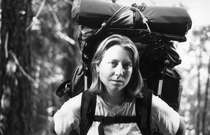 Thank goodness the pre-journey set-up is not too long, and thank goodness that there is a years-after objectivity to Strayed's description of her travail, a knowingness by the reader that she did make it through. This, at least for me, increased my attention on the author's fortitude and just plain stubbornness as she struggles her way to the PCT's trailhead and then plunges into her wild adventure--unprepared, ignorant, out of shape, and with a knowingness that she had nothing to lose. A great deal of the pleasure of reading this narrative was to witness the slow (and painful) progression of the author to both inner and outer strength. As the story progressed and the author grew more trail savvy, the story developed its own momentum, its own increasingly headlong dash to self-actualization.
Thank goodness the pre-journey set-up is not too long, and thank goodness that there is a years-after objectivity to Strayed's description of her travail, a knowingness by the reader that she did make it through. This, at least for me, increased my attention on the author's fortitude and just plain stubbornness as she struggles her way to the PCT's trailhead and then plunges into her wild adventure--unprepared, ignorant, out of shape, and with a knowingness that she had nothing to lose. A great deal of the pleasure of reading this narrative was to witness the slow (and painful) progression of the author to both inner and outer strength. As the story progressed and the author grew more trail savvy, the story developed its own momentum, its own increasingly headlong dash to self-actualization.I bicycle camp, tucking my living not into my backpack but into my bike's panniers. Wild made me want to hit the trail, and not just because of the author's turnaround of her lifestream. Her ability to describe the beauty of the trail, even with its many challenges, was revelatory: sun and sky, earth and stone, the green world and the clouds and rain.
Over fifteen years later, Strayed glamps for Vogue, and even with tent-cabins and massages and gourmet meals at the lodge, she still narrows the experience of the wild to being outside, blue sky above and mountain smells as the feet hit the trail. The unbounded immensity of nature, whether inside us or outside, is there really a difference? There need not be. Beneath the grime of the toil of the trail lies the bare bones of the earth--or the bare bones of the soul, beautiful in their austerity, in their sharp, hard lines. One reviewer praised the narrative because of the power of the author's voice, and I can concur. The author in this book has found her voice, a voice speaking with authenticity from the wilderness. If we step onto the trail, we can hear its haunting song.

Published on December 16, 2018 05:54
December 9, 2018
Never Too Old (or Young) to Learn a New Word
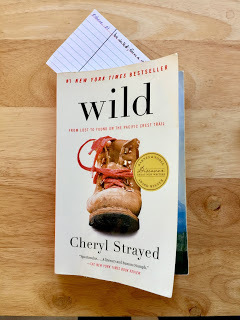 Today I've just remembered an old vocabulary-building trick that I used years ago--using a 3x5 index card as a bookmark, and writing vocabulary words from the book on the card as I come across them. That's the gist of it.
Today I've just remembered an old vocabulary-building trick that I used years ago--using a 3x5 index card as a bookmark, and writing vocabulary words from the book on the card as I come across them. That's the gist of it.I have several steps to choosing, recording, researching, and memorizing a word.
Choosing: Words can be either words that I simply do not know, or they can be words that I know but want a clearer definition for. As an example, in my current reading I have chosen the verb "cohere." I know the meaning but usually see the adjective or adverb derivative, not the verb form. Therefore, I have chosen the word in order to deepen my understanding, not to introduce myself to a new word.Recording: On a 3x5 index card, I draw a line parallel to the left edge, about 1.5 inches to the right of the edge. In this space, I write words I choose and the page number where each word is used. That way, I can return to the author's usage of the word, both to increase my understanding of the text and to increase my familiarity of how the word is used.Researching: I reference a dictionary, either an online source or my Webster's hard-bound, unabridged dictionary. All the familiar information is available: meaning, examples, variations, to name just a few. I write the definition to the right of the word in the remaining four inches of the index card.Memorizing: Repetition over time is key to memorizing, so I refer to my list as I return to reading the book, looking over the words and definitions. Another powerful memorization tool is to use the word, so sometimes I'll create sentences that use the word. "The facts suddenly cohered into an understanding of what had taken place."I'm glad I remembered this technique. When I taught, I used this as a means of vocabulary development for my students. It was more meaningful for them since their words were self-chosen and came from books and stories they had selected themselves. Words the students chose were a part of their lives, and this increased motivation. It was a bear to evaluate, though, because every student required individual evaluation time.
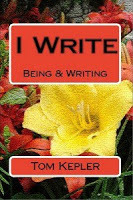 I've also just realized (or remembered) that I included this technique in my book about writing,
I Write: Being and Writing
. The book is divided into three sections on the writer, the process of writing, and the written word. I placed this little vocabulary building technique in the second section. I believe that the path to being a good writer includes being a good reader.
I've also just realized (or remembered) that I included this technique in my book about writing,
I Write: Being and Writing
. The book is divided into three sections on the writer, the process of writing, and the written word. I placed this little vocabulary building technique in the second section. I believe that the path to being a good writer includes being a good reader.Right now, I'm reading Cheryl Strayed's Wild: from Lost to Found on the Pacific Coast Trail , and I can't wait to find my next word.

Published on December 09, 2018 06:30
November 28, 2018
The Joy of Maintaining a Blog
 Somehow, I've ended up with three blogs.
Somehow, I've ended up with three blogs.The sentence above was the rough draft beginning of this post. I should have cut it because it was just a beginning, a means of initiating the flow of ideas and words, but then I realized it was a good hook, actually, the old strategy of beginning with an opposite point of view. The word somehow implies that I'm not sure how I've ended up with three (or perhaps four) blogs, but that implication is inaccurate. I like to write about what I'm doing; I like to write about my passions, or as Joe (Campbell) said, about my bliss. There is a very real joy in maintaining a blog.
Three blogs: writing, tiny trailer camping, and bicycling (the fourth a specialized bicycle journaling web community). This blog, Tom Kepler Writing, was my first blog. I started it when I began to independently publish my writing. Over nine years I've posted almost six hundred times.
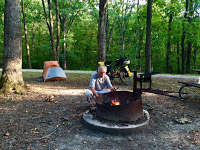 Then I began this bicycle riding thing, and I decided to write about my experiences and to also see how well I could structure a blog, having had some experience with my writing blog. I've been writing about bicycles at Tom Kepler Bicycling for six years now. That blog was a joy to write and develop, but what I found was that another website, Crazy Guy on a Bike, is a community of thousands of touring bicyclists from all around the world. It's a pool of readers that I can tap into that isn't accessible with Tom Kepler Bicycling. I began posting to both sites, sometimes the same article. Right now, I still keep up TKB but feel that eventually more writing will be posting at CGOAB just because the site is so lively and interactive.
Then I began this bicycle riding thing, and I decided to write about my experiences and to also see how well I could structure a blog, having had some experience with my writing blog. I've been writing about bicycles at Tom Kepler Bicycling for six years now. That blog was a joy to write and develop, but what I found was that another website, Crazy Guy on a Bike, is a community of thousands of touring bicyclists from all around the world. It's a pool of readers that I can tap into that isn't accessible with Tom Kepler Bicycling. I began posting to both sites, sometimes the same article. Right now, I still keep up TKB but feel that eventually more writing will be posting at CGOAB just because the site is so lively and interactive. My most recent blog is Green Goddess Glamping, began with the acquisition of a tiny, "tall," teardrop trailer. Bicycle camping, I found, was an activity I pursued alone. I wanted to share the camping experience with my wife; however, with her business, bicycle touring as not an option. What was an option was a mobile office, our tiny trailer, that allowed us to camp and for my wife to still work. As a consultant, almost all her work is carried out by phone or computer. We focus on campgrounds with good phone signal strength so we can utilize the phone's hotspot for internet.
My most recent blog is Green Goddess Glamping, began with the acquisition of a tiny, "tall," teardrop trailer. Bicycle camping, I found, was an activity I pursued alone. I wanted to share the camping experience with my wife; however, with her business, bicycle touring as not an option. What was an option was a mobile office, our tiny trailer, that allowed us to camp and for my wife to still work. As a consultant, almost all her work is carried out by phone or computer. We focus on campgrounds with good phone signal strength so we can utilize the phone's hotspot for internet.The interesting marketing connection for GGG is that I belong to three Facebook tiny trailer groups, so I have an instant distribution network for blog posts of around 15,000 members. Posting on this network is not passive, though, because by interacting with member FB posts, I increase my presence and also find subjects for stories that interest the groups' members. For instance, my most-read post on GGG is about tiny trailers and toilets! Of the top five posts in terms of readership, the first four are idea pieces; not until the fifth does one of my narratives of a camping trip make the list, the story about a camping trip to Lake Rathbun in SE Iowa, "A Camping Trip as Sweet as Honey."
I could create more blogs--one about gardening. I've been a dedicated organic gardener for almost forty years. I could have created a blog about education--I am a retired, career educator. I could specialize the subjects of this writing blog--separate the subjects of reading and reviews from writing. However, I feel pretty saturated right now. Enough is enough, and enough is a joy. I don't want that joy to become a burden!
The title of this blog, though, specifies maintaining a blog, not just writing blog posts. Writing about my passions is the main joy of these blogs, but there are other joys, such as selecting blog layout, adding gadgets, learning a little html, and polishing photography and photoshopping techniques. The blogs are platforms that allow active participation in these areas. The blogs are really the "labs" for applying self-taught skills. I was a career educator, but I am a lifelong learner.
 Cropping, adding text, adjusting color and exposure, and sizing this photo demonstrates fun skills acquiredHere is a quick list of some of the joys of maintaining a blog:
Cropping, adding text, adjusting color and exposure, and sizing this photo demonstrates fun skills acquiredHere is a quick list of some of the joys of maintaining a blog:Writing articles about my interests. I'm able to delve deeply into subjects, researching and then organizing my new-found knowledge around concepts that provide meaning for me (and, hopefully, my readers).Actively marketing my writing. Over time, I've learned a few of the basic techniques of marketing, although I have to admit my engagement has been desultory. The bicycling and camping blogs, though, provide me with marketing opportunities and practice in marketing online, even though there is no monetary advantage for me. It's just expanding a circle of readers for the pure fun of it. Good practice, though. I'm learning a lot that I can use with my published writing.Interacting with like-minded individuals regarding my favorite activities. These online interactions, especially with my bicycle and trailer camping pursuits, are really the best internet social interactions I've ever had, just good, innocent sharing and enjoyment of an interest.Designing my blog. I enjoy adding new header photos to my trailer blog. I have a lot of photos, and it's fun to compose the photo with a header in mind (keeping a good space for the title). It's fun to add gadgets so that my top-read articles are displayed on a sidebar. I use a Chromebook app for some simple work with photos and find that a real motivator. The "Stats" diagnostic page for my blog provides me with interesting and useful information. These are just a few of the ways that I enjoy managing my blogs.Finally, the relationship between my blogs and social media platforms is a continuing learning experience, a mystery, and an acquired art--something that I don't truly understand much of the time, but something that I'm learning and becoming better at. Again, especially my trailer camping blog has provided me with insights, both as to the potential and also to the limitations of social networks. So far, I'm just involved with Facebook tiny trailer camping groups and the bicycle touring site Crazy Guy on a Bike. I haven't jumped onto Instagram, for instance, and for Twitter I just have automatic posts for this blog. All said, I guess you can just call me an amateur, since the root of that word is love and I'm just doing all this writing for the love of it. I don't need the money (although I wouldn't mind more). I don't need the fame (although I want my writing to be appreciated). I'm not particularly interested in the whirlwind lifestyle that sometimes comes with fame. It would be interesting to hit a few late night talk shows, but that's quite a distance from a quiet campground in a tiny trailer, not to mention from humping down a country road on a touring bicycle!
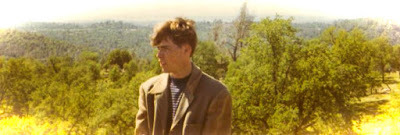 Following my bliss, 1970"Following my bliss," though, to reference Joseph Campbell again, is a means of continuing my fiction writing. I have three older short stories that it occurs to me I could publish as a free ebook as a lead for my other writing. I've been doing some short story writing. Maintaining my blogs and regularly writing is an oil on the hinges of a door I want to keep open. I like writing, and if you like reading what I've been writing, just follow the links for more!
Following my bliss, 1970"Following my bliss," though, to reference Joseph Campbell again, is a means of continuing my fiction writing. I have three older short stories that it occurs to me I could publish as a free ebook as a lead for my other writing. I've been doing some short story writing. Maintaining my blogs and regularly writing is an oil on the hinges of a door I want to keep open. I like writing, and if you like reading what I've been writing, just follow the links for more!
Published on November 28, 2018 08:26



